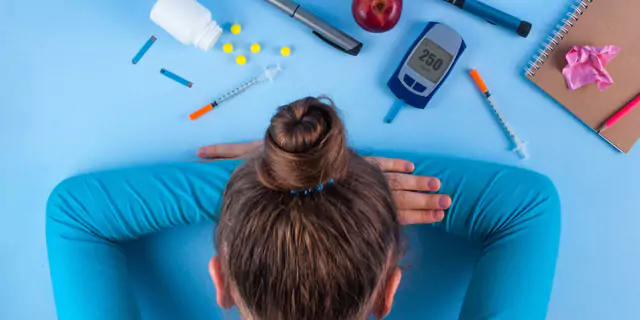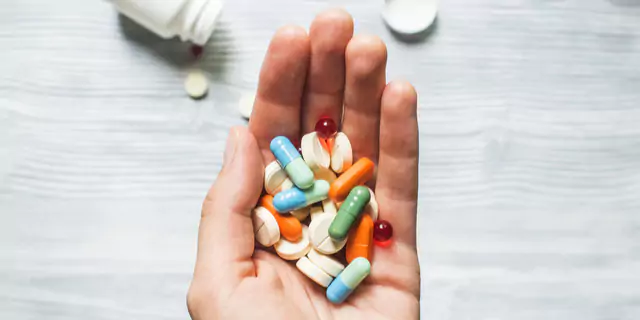Hypoglycemia Without Diabetes: Symptoms, Causes, and Prevention

Key Takeaways
Hypoglycemia, or low glucose, can affect people without diabetes. While not a disease, it can indicate underlying health issues and is often linked to diet, medications, or excessive alcohol use. Understanding the symptoms and causes is the first step toward prevention and informed day-to-day choices..
Main points at a glance:
- A common cause is reactive hypoglycemia, where glucose drops too low after a meal, often one high in refined carbohydrates.
- Learn helpful prevention strategies, such as eating smaller, more frequent meals that include protein, healthy fats, and fiber.
- The Nutrisense program uses a biosensor to measure glucose in your interstitial fluid, helping you see how your body responds to food and lifestyle choices.
Low Glucose, High Awareness
You've likely heard of hypoglycemia or low glucose levels. Although it's typically associated with people who have diabetes, it's a condition that anyone can experience.
While it's not a disease per se, it can indicate health issues, so it's crucial to stay on top of it. You should know enough about the condition so you're aware of the symptoms, what can cause it, and what you can do to prevent it from happening. Read on to find out all this and more!
Hypoglycemia at a Glance
Before we walk through the signs and symptoms, it's essential to understand what this condition is. Hypoglycemia, or low glucose, is a condition that people experience when their glucose levels are dangerously low. This is the opposite of hyperglycemia or high glucose.
While it's normal for glucose values to rise and fall, extremely low glucose can cause adverse side effects. And, while you can track some of the symptoms of hypoglycemia, they usually vary depending on the individual and the severity of how the body handles the glucose reduction.
What are the signs and symptoms of hypoglycemia?
Since not everyone has the same symptoms of hypoglycemia, it's not always easy to pinpoint when you're experiencing them. There are also varying levels of severity for these symptoms and a difference in severity in the condition itself. There's hypoglycemia, and then there's severe hypoglycemia.
When a ‘Healthy’ Lunch Leads to a Slump
It’s 3 p.m., and you’re trying to power through the afternoon. You felt good after your quick lunch, but now a familiar feeling is creeping in. A sudden wave of anxiety washes over you, your hands feel a little shaky, and you can’t seem to focus on the task in front of you.
You feel dizzy and inexplicably hungry, even though you ate just a few hours ago. It’s frustrating to try to make good choices, only to feel drained and irritable afterward.
Severe hypoglycemia
Severe hypoglycemia occurs when glucose values drop so low that you require assistance administering either medication or fast-acting carbohydrates. You can address these hypoglycemic symptoms (and often even reduce risk) in less severe cases through simple diet and lifestyle modifications.
When Warning Signs Go Quiet
Severe lows and nighttime episodes can look different from daytime symptoms. If symptoms are intense or you cannot self-treat, seek urgent medical care.
Some people experience hypoglycemia unawareness, where early warning signs feel muted or are missed, especially during sleep. To review patterns, some use a continuous glucose monitor that shows glucose measured in interstitial fluid 24/7.
- Severe hypoglycemia symptoms can include confusion or disorientation, clumsiness or trouble with coordination, slurred speech, seizures, or loss of consciousness.
- Additional warning signs that can precede or accompany lows: tingling of the lips, tongue, or cheeks, blurred vision, and difficulty concentrating.
- Nocturnal hypoglycemia cues include restless sleep, nightmares, sweating or damp sheets, crying out during sleep, waking tired or confused, and a morning headache.
Common symptoms
It's always a good idea to be aware of all the possible symptoms so you can address them before they become an issue. Whenever you experience the following, consider noting down the occurrence and severity so you can keep track:
- Hunger
- Dizziness/lightheadedness
- Shakiness
- Excess sweating
- Anxiety
- Headaches
- Blurred vision
- Inability to concentrate
- Weakness
- Pale skin
What causes hypoglycemia without diabetes?

Now that we've taken a look at the signs and symptoms, we're sure you're wondering what causes them. Are they unhealthy food choices? What about your routine and lifestyle choices? Does medication affect your levels, too? It can be challenging to keep track of everything going into your body. Still, an easy way to do this is to get a continuous glucose monitor to see what your body is reacting to 24/7. In the meantime, here are some of the most common causes of the condition to focus on:
Reactive Hypoglycemia and Pre-diabetes
There are many reasons why hypoglycemia may occur among people who don't have diabetes. One of the most common causes is something called reactive hypoglycemia. It occurs after a meal that is typically high in refined carbohydrates. In these cases, your body overproduces the amount of insulin that it needs to process the meal, which results in your glucose dipping too low. Reactive hypoglycemia may be an early sign that you're at a higher risk of developing diabetes.
Medications

Many types of medication can cause hypoglycemia, especially if you have diabetes. For example, if someone with diabetes takes too much of their insulin or other diabetic medications, it can cause hypoglycemic events. While medication-induced hypoglycemia is less common among those without diabetes, it's still a risk if you're taking certain medicines. Here's a list of drugs that are known to cause drug-induced hypoglycemia:
- Diabetic medications and insulin (if the dosage is too high or not appropriate for meals/activity)
- Antibiotics (like quinine, Bactrim, gatifloxacin, pentamidine, fluoroquinolones)
- Indomethacin
- Beta-blockers
- Cibenzoline
- Quinidine
- Bile Acid Sequestrants (like Welchol)
- ACE/Inhibitors
- Salicylates
If you have questions about any of the drugs you’re taking and whether they put you at risk of hypoglycemia, it’s best to discuss them with your medical provider.
Liquor Consumption
If you've been fasting when you consume alcohol, or you have a history of alcohol abuse, liquor will increase your risk of developing hypoglycemia. As with most other factors, it's more of a risk for those with diabetes, but those who don't have diabetes are not in the clear here.
So, why does alcohol affect this condition so much, and how? The primary cause of alcohol-induced hypoglycemia is the inhibition of gluconeogenesis, or the creation of glucose from non-carbohydrate substrates. Alcohol may potentially increase endogenous insulin secretion, contributing to the risk of hypoglycemic events in some individuals.
Disorders of the Organs That Control Glucose Regulation (Kidney, Liver, Heart)
Several key organs play a role in glucose regulation. If you have a history of kidney, liver, or heart issues, this may disrupt glucose regulation and increase your risk of experiencing hypoglycemia. Let's break this down a little more:
- Kidneys: Your kidneys play a vital role in glucose homeostasis. They're responsible for a host of processes, including gluconeogenesis, glucose filtration, glucose reabsorption, and glucose uptake. Some studies have found that the kidneys are responsible for about 20% of glucose production via gluconeogenesis.
- Liver: Your liver plays a vital role in multiple glucose homeostasis pathways, including glycolysis, gluconeogenesis, glycogenesis, and glycogenolysis.
- Heart: We don't always think of the heart as a glucose regulator, but the circulatory system plays a significant role in glucose regulation. Hormones such as glucagon are carried via the blood, which then signals other organs to regulate glucose. If there is any damage to the circulatory system, it can negatively impact your health.
Eating Disorders and Diet
There's no doubt that diet plays a distinct role when it comes to hypoglycemia. Unbalanced diets that are higher in refined carbs (candy, crackers, sugar-sweetened beverages) and low in protein and fat are often associated with hypoglycemic events and 'energy crashes.'
On another note, if someone is fasting or skipping meals, the body may not be able to handle long periods without incoming carbohydrates. People who don't have diabetes but struggle with frequent hypoglycemic events may want to focus on increasing their metabolic flexibility as a long-term preventive plan.
Pregnancy
Hypoglycemia during pregnancy is more common than you'd think. It often occurs during the first trimester, when nausea and vomiting are most prevalent. However, it can also occur at any time during a pregnancy. During this time, a growing baby requires constant glucose and will siphon as much as they need from the mother. For this reason, eating frequent meals, maintaining a balanced diet, and replenishing those glucose stores are essential to help you prevent the condition.
Who is at higher risk for hypoglycemia?

By now, we know what hypoglycemia is, what the symptoms are, and the causes to watch out for. And we also know that it's not a condition that only those with diabetes experience. But are there any other risk factors? Are some people more at risk than others? Here's what you need to know:
Obesity
Obesity is a complex health condition that's linked to insulin resistance. People with insulin resistance may have imbalanced hormones, making it difficult for their bodies to maintain normal glucose levels endogenously. High insulin levels, which often occur among insulin-resistant people, may lead to low glucose drops during fasting times.
Family History of Diabetes
Yes, a family history of diabetes does put you at a higher risk of developing pre-diabetes and experiencing hypoglycemia. Learning more about your family's health history (specifically related to diabetes) can provide great insights into whether you should get a diabetes screening. Taking preventive measures to ensure that your glucose values are in an optimal range will also help reduce your risk of diabetes.
Stomach Surgery
People who have undergone bariatric surgery often have a higher risk of hypoglycemia, reactive hypoglycemia, and hyperglycemia. This is because of dumping syndrome and reduced stomach size.
Dumping syndrome, or the rapid emptying of the contents of your stomach, can lead to excessively high and low glucose values. Reactive hypoglycemia is also very common and is thought to be caused by hyperinsulinemia and an altered GLP-1 response.
Pre-diabetes
Pre-diabetes means that your glucose is above the normal range, but below the diabetic range. When your glucose values see an elevation over a long period, your pancreas will secrete insulin to help lower these values. Circulating insulin allows glucose to enter the cells, which will help glucose values decrease.
When your glucose values drop, your pancreas slows down the production of insulin. For those who have pre-diabetes, this process does not work as well as it should. Eventually, this leads to an overproduction of insulin and poor glucose regulation.
Ways to Diagnose Hypoglycemia

Diagnosing and treating hypoglycemia typically involves three steps that your doctor will likely need to help you with. These include measuring low glucose, pinpointing the symptoms of hypoglycemia, and finally, finding relief from the symptoms by treating the hypoglycemia. There are two primary tests that your doctor can do to diagnose hypoglycemia.
Fasting Tests
You may need to undergo a fasting test since hypoglycemia can occur in a fasted state (long periods without eating). During this test, you would fast overnight or up to 72 hours. Your blood will be drawn at different times during this period to measure your glucose levels. If you see glucose values of <55 mg/dL with symptoms, it may indicate hypoglycemia; a clinician will interpret the results.
Talk to your medical provider about the testing before you decide. Ideally, you should undergo the tests when you experience the symptoms, but this isn't always possible. In some situations, you can also receive these tests during a prolonged fasting state under the supervision of a health professional.
Mixed-Meal Tolerance Test
Another test to diagnose hypoglycemia is a mixed-meal tolerance test. This is a good option for people who experience reactive hypoglycemia, or hypoglycemia symptoms, after a meal. It's important to note that this test is not well standardized.
Typically, the test is performed after an overnight fast. In the morning, you're given a meal that's similar to one that triggers hypoglycemic symptoms. A medical professional will observe you for several hours while labs are drawn every 30-60 minutes for a total period of five hours. Similar to fasting tests, your physician orders all labs.
Helpful Strategies for Preventing Hypoglycemia
Understanding the root cause of your hypoglycemia will help you prevent these events from occurring. So, when you're creating a preventive plan with a healthcare professional, address every factor, including medication, diet, exercise, your health history, and your family's health history. Here are some other changes you can incorporate into your routine to prevent the condition:
Eat Balanced Meals Consistently

One of the leading causes of hypoglycemia among people who don't have diabetes is going without food for extended periods. To help prevent hypoglycemic episodes, eating smaller, more frequent meals will help. In addition to meal timing, meal content also plays a significant role. Make sure you include protein, natural fat, and non-starchy carbohydrates in every meal you eat. Here are some examples to help you start planning your meals:
- Breakfast: A spinach-and-egg omelet cooked in grass-fed butter, with a handful of berries on the side.
- Lunch: Wild tuna with olive oil, sesame seeds, almond crackers, chopped raw veggies, and a handful of raspberries.
- Snack: An apple with almond butter.
- Dinner: Grilled chicken with sweet potatoes, along with an arugula and cherry tomato salad drizzled with olive oil.
Alleviate Symptoms With the Correct Foods

It's also a good idea to know what to do to correct things as soon as you experience symptoms of hypoglycemia. An easy fix is to immediately consume 15 grams of fast-acting carbohydrates. These can include:
- 4 ounces of fruit juice
- 1 small piece of fruit
- 1 tablespoon of sugar or honey
- 3-4 glucose tablets
- 3 peppermint candies (not sugar-free)
Have Healthy Snacks on Hand
While these foods are a helpful way to correct hypoglycemic symptoms, you shouldn't make them a regular part of your diet. For good long-term health, it's best to focus on prevention and avoid consuming too much of these high-sugar foods. Remember that even if you have a set diet plan for every meal of the day, you should keep healthy snacks on hand. This way, you're not reaching for anything too unhealthy when you feel hungry in between meals. This will help avoid hypoglycemic episodes and keep you healthier. Here's a good starter list of healthy snacks:
- Edamame + blueberries
- Cheese + an apple
- Nuts + berries
- Nut butter + fruit
- Plain Greek yogurt + nuts
- Hummus + vegetables (cucumbers, celery, cherry tomatoes)
- Avocado + almond crackers
Find the right Nutrisense programto turn insight into progress.
FAQs about hypoglycemia without diabetes and the Nutrisense program
Q1. Can a CGM help me spot hypoglycemia patterns if I do not have diabetes?
A1. Yes. Nutrisense pairs a glucose biosensor with the app so you can view 24/7 trends of glucose measured in interstitial fluid, with data every 15 minutes. Log meals, activity, and symptoms to see what precedes dips, then review patterns with a registered dietitian. CGMs do not diagnose conditions. For urgent or severe symptoms, contact your healthcare provider.
Source: CGM without Diabetes
Q2. How do I record a suspected low in the Nutrisense app?
A2. Open the app to log the event. Add the time, symptoms, and what you ate or drank. Scan your biosensor to sync your glucose, then tag the entry for quick review. You can set up experiments around meals or routines to compare days and share your logs during a nutritionist video call for personalized feedback.
Source: Nutrisense App
Q3. How many sensors do I receive, and how long do each last?
A3. Memberships include two glucose biosensors per month. Each sensor typically lasts 15 days once activated, so a pair covers about one month. You can apply sensors on your schedule and space them out as needed. If you need to adjust shipments or your plan, contact support before your next billing date.
Source: CGM Plans
Q4. Can I pause my account or space out sensor use if symptoms are occasional?
A4. Yes. You can pause in 30-day blocks based on your plan length, and you may space out sensor use since activation timing is up to you. After the initial term, plans continue month to month. To request a pause or changes, email support before your next billing date.
Source: CGM Plans
Q5. Are dietitian video calls covered by insurance to discuss glucose dips?
A5. Many members use insurance for 1:1 video calls with registered dietitians. You can check eligibility online in minutes. Nutrisense accepts plans from major insurers across all 50 states, and many members have zero out-of-pocket costs. You can also self-pay for sessions if preferred.
Source: Nutritionist video calls
Go Beyond Glucose Data with Nutrisense
Your glucose can significantly impact how your body feels and functions. That’s why stable levels are an important factor in supporting overall wellbeing. But viewing glucose isn't enough. Nutrisense, you’ll be able to learn how to use your body's data to make informed lifestyle choices that support healthy living.
One-to-one coaching
Sign up to access insurance-covered video calls to work with a glucose expert: a personal registered dietitian or certified nutritionist who will help tailor your lifestyle and diet to your goals.
Monitor and measure what matters
With the Nutrisense CGM Program, you can monitor your glucose with health tech like glucose biosensors and continuous glucose monitor (CGM)s, and analyze the trends over time with the Nutrisense App. This will help you make the most informed choices about the foods you consume and their impact on your health.
Find your best fit
Ready to take the first step? Start with our quiz to find the right Nutrisense program to help you take control.
Go Beyond Glucose Data with Nutrisense
Your glucose can significantly impact how your body feels and functions. That’s why stable levels are an important factor in supporting overall wellbeing. But viewing glucose isn't enough. With Nutrisense, you’ll be able to learn how to use your body's data to make informed lifestyle choices that support healthy living.
Work with a dietitian
Sign up to access insurance-covered video calls with a glucose expert: a personal registered dietitian or certified nutritionist who will help tailor your lifestyle and diet to your goals.
Monitor and analyze data
With the Nutrisense program, you can monitor your glucose with health tech like glucose biosensors and continuous glucose monitors (CGM), and analyze the trends over time with the Nutrisense App. This will help you make the most informed choices about the foods you consume and their impact on your health.
Get started
Ready to take the first step? Start with our quiz to find the right Nutrisense program to help you take control.

Kara Collier is a registered dietitian nutritionist and certified nutrition support clinician who is passionate about reshaping how we approach prevention, behavior change, and metabolic health. A Forbes 30 Under 30 honoree, she’s helped over 150,000 people improve their metabolic health using tools like continuous glucose monitors and behavior-focused nutrition strategies. Kara has been featured by Forbes, UC Berkeley, and HLTH, and has appeared on top podcasts like Mind Pump and The Genius Life.


.webp)

